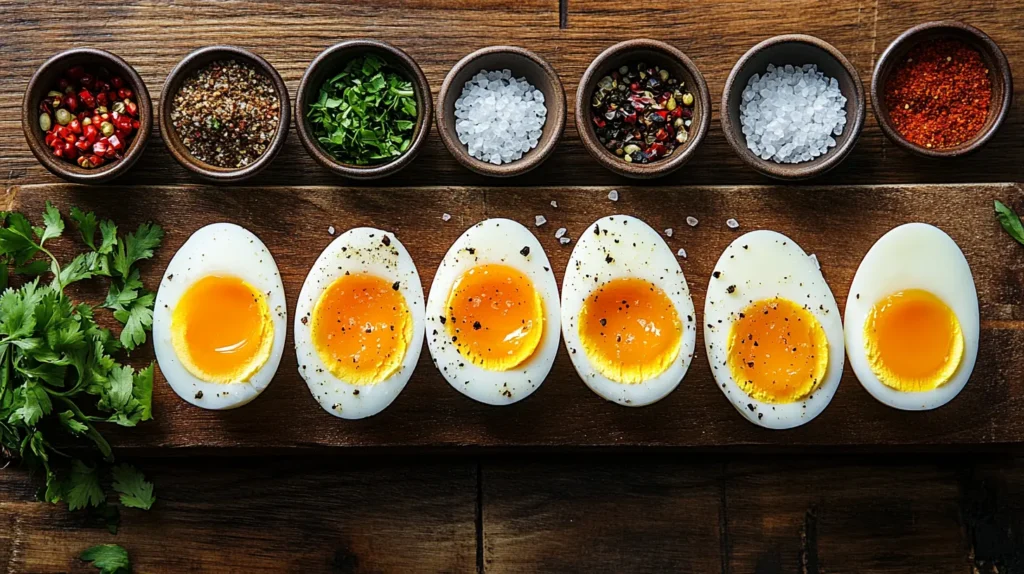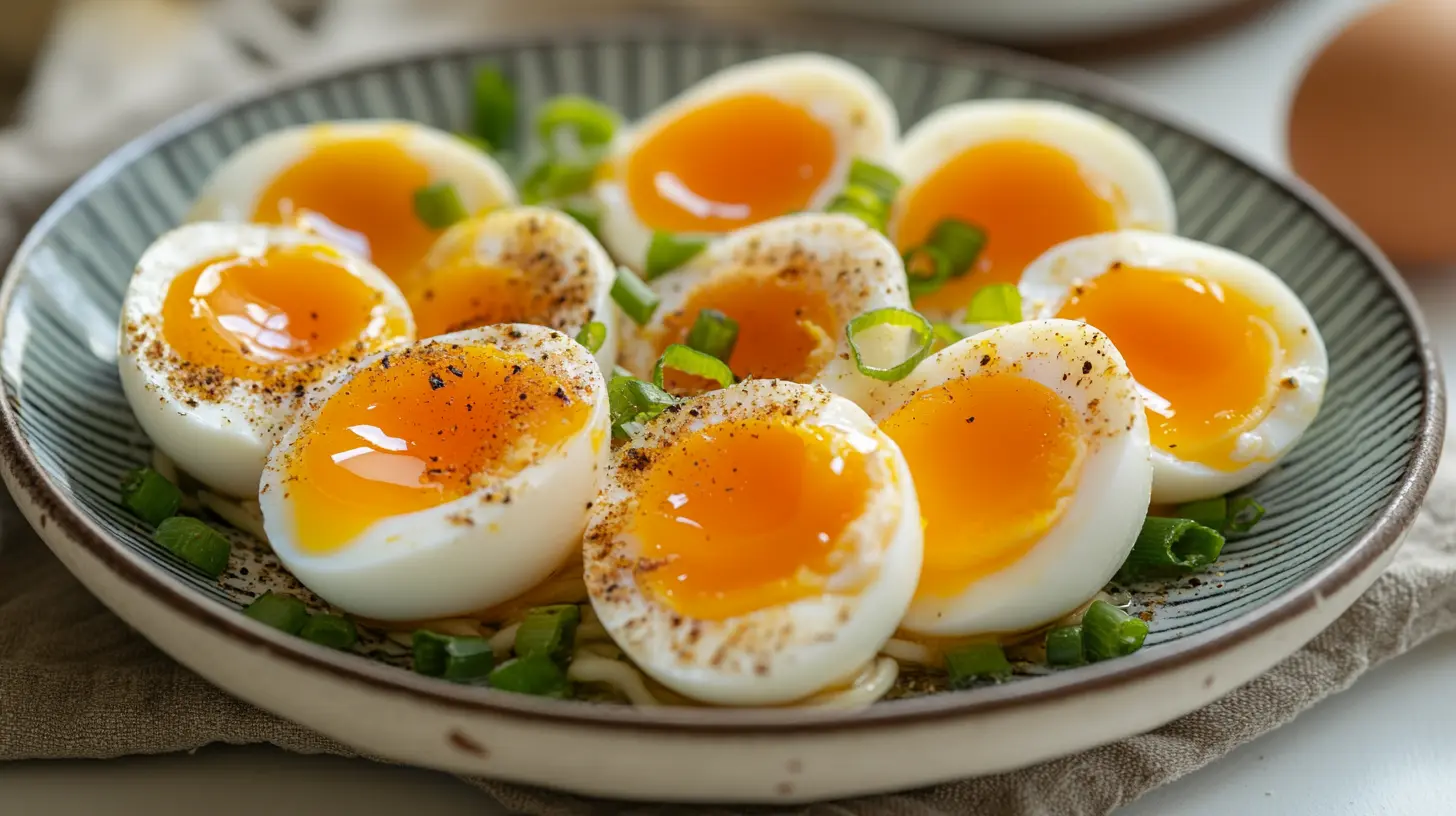Eggs are versatile, wholesome, and universally loved. Among the myriad ways to prepare them, jammy eggs have captured the hearts of foodies and chefs alike. But the big question remains: how long to boil an egg for jammy perfection? Why? Because getting that creamy yolk and tender white just right requires precise timing.
In this guide, you’ll discover exactly how long to boil an egg for jammy, the prep work involved, tips for flawless results, and plenty of serving ideas to impress at your next meal. Ready to dive in? Let’s crack on!
Introduction to Jammy Eggs
What Are Jammy Eggs?
Jammy eggs are soft-boiled eggs with yolks that are just cooked enough to achieve a silky, custard-like consistency. Unlike runny soft-boiled eggs or fully hard-boiled ones, jammy eggs sit in the Goldilocks zone of egg preparation. Their golden yolks are slightly firm but remain luxuriously creamy—ideal for adding richness to dishes like ramen, salads, or even toast.
Why Are Jammy Eggs Popular?
The appeal of jammy eggs lies in their versatility and texture. Whether you’re looking to elevate a simple bowl of noodles or garnish your avocado toast, they bring the perfect mix of flavor and indulgence. Plus, they’re quick and easy to make with just a pot of boiling water, a timer, and some basic know-how.
Overview of Cooking Methods for Jammy Eggs
When it comes to cooking jammy eggs, boiling is the go-to method, but there’s more to it than just tossing eggs into hot water. From the water’s temperature to the exact cooking time, every detail matters. Some people even swear by steaming instead of boiling! In this guide, we’ll focus on boiling, highlighting precise timings to achieve yolky perfection.
Preparation Before Boiling
Choosing the Right Eggs: Fresh vs. Older Eggs
When preparing jammy eggs, the age of your eggs matters more than you might think. Fresh eggs, while great for frying or poaching, can be tricky to peel after boiling. Slightly older eggs (about a week old) are easier to handle and won’t leave you frustrated with stuck-on shells. Why? The pH level of the egg white increases as the egg ages, which loosens it from the shell membrane.
So, if you’re wondering, “How long to boil an egg for jammy?” the answer starts with using eggs that are at their peeling prime. This simple step sets you up for success before you even reach for the pot.
Room Temperature vs. Cold Eggs: What’s Better?
Starting with room-temperature eggs is your best bet for even cooking. If you toss cold eggs straight from the fridge into boiling water, the sudden temperature change can cause the shells to crack. To avoid this, let your eggs sit at room temperature for 10-15 minutes before boiling.
If time is tight, place the cold eggs in warm (not hot) water for 5 minutes as a quick fix. This step ensures you won’t end up with unevenly cooked yolks or runny whites.
Essential Tools and Ingredients Needed
You don’t need fancy gadgets to make perfect jammy eggs, but having the right tools can make the process smoother. Here’s a quick checklist:
- A medium or large pot (big enough to give the eggs some room to move).
- A slotted spoon or tongs for lowering eggs gently into the water.
- A timer—precision is crucial!
- An ice bath (a bowl of ice water) for halting the cooking process.
Having these essentials on hand makes boiling jammy eggs foolproof. With the tools ready, you’re one step closer to mastering how long to boil an egg for jammy perfection!
Step-by-Step Guide to Boiling Jammy Eggs
Boiling Water and Timings: Key Variations
Timing is everything when it comes to jammy eggs. Here’s a breakdown of the boiling times for different yolk textures:
- 6 Minutes: For eggs with a runnier yolk and just-set whites, ideal for dipping.
- 6.5 Minutes: The classic jammy texture—creamy, slightly firm yolks with fully set whites.
- 7 Minutes: A firmer yolk with a velvety center, perfect for those who prefer a less runny yolk.
To get consistent results, make sure the water stays at a steady boil. Lower your eggs gently into the pot with a slotted spoon to prevent cracking. As soon as the timer dings, transfer the eggs to an ice bath.
How to Achieve Perfect Timing (Tips & Tricks)
Ever boiled eggs for what felt like the right amount of time, only to end up disappointed? Precision is the secret to mastering how long to boil an egg for jammy. Here are some tried-and-true tips:
- Start your timer the moment the eggs hit the boiling water.
- Use a rolling boil rather than a simmer for more predictable results.
- Avoid overcrowding the pot; this ensures even cooking.
What to Avoid: Common Mistakes While Boiling Eggs
Mistakes happen, but they’re easy to avoid if you know what to watch for. Here are a few pitfalls:
- Skipping the ice bath: This step halts cooking instantly, preventing overcooked yolks.
- Boiling too long: Even an extra minute can turn a jammy egg into a hard-boiled one.
- Using old timers: Precision is key, so check that your timer is reliable.
Cooling and Peeling Jammy Eggs
Importance of the Ice Bath
Once your eggs are done boiling, timing doesn’t stop there. Quickly transferring them to an ice bath is crucial for locking in that perfect jammy texture. The ice bath halts the cooking process instantly, preventing your yolks from becoming overcooked and chalky. Without this step, even if you’ve nailed how long to boil an egg for jammy, your efforts could still result in a firmer yolk than desired.
Fill a large bowl with cold water and ice, and gently place your eggs in the bath for at least 5 minutes. This not only cools the eggs but also helps loosen the shell, making peeling a breeze.
Techniques for Easy Peeling Without Breaking
Peeling boiled eggs can sometimes feel like a test of patience. For jammy eggs, which have softer whites, using the right technique is a lifesaver. Here’s how to do it:
- Tap the egg gently on a hard surface to create small cracks all over.
- Roll it under your palm to loosen the shell further.
- Peel starting from the wider end, where there’s an air pocket.
If the shell sticks, peel under running water to help separate the shell from the egg white. These steps ensure your jammy eggs look as good as they taste!
Signs of Overcooked or Undercooked Jammy Eggs
Knowing what went wrong can help you troubleshoot for next time. Overcooked jammy eggs often have a grey-green ring around the yolk and firmer whites. Undercooked ones, meanwhile, will have runny whites that can’t hold their shape. Timing is everything when answering the question, “How long to boil an egg for jammy?”

Serving Ideas and Pairings
Using Jammy Eggs in Dishes: From Ramen to Salads
Jammy eggs shine as a versatile addition to a variety of meals. In a steaming bowl of ramen, their creamy yolks mix with the broth, adding richness. On top of a salad, they create a delightful texture contrast and boost flavor. Other dishes, like grain bowls or avocado toast, also benefit from their velvety goodness.
Want more breakfast inspiration? Check out this egg casserole recipe for a hearty morning option.
Creative Serving Suggestions for Brunch or Snacks
Looking to impress brunch guests? Serve jammy eggs as part of a charcuterie board with crusty bread, cheeses, and pickles. Or, simply sprinkle them with sea salt and cracked pepper for a quick, satisfying snack. Their vivid golden centers make them Instagram-worthy, too!
How to Store and Reheat Jammy Eggs
Storing jammy eggs is easy. Place peeled or unpeeled eggs in an airtight container in the fridge, where they’ll keep for up to 3 days. To reheat, immerse them in warm (not boiling) water for a couple of minutes. This keeps the yolks soft and prevents overcooking.
FAQs About Jammy Eggs
How Do I Adjust Cooking Time for Different Egg Sizes?
Egg size plays a big role in determining how long to boil an egg for jammy. Larger eggs may need an extra 30 seconds to achieve the perfect jammy texture, while smaller eggs might only require about 6 minutes. To ensure consistency, always use eggs of similar size in one batch.
A quick tip: Medium eggs work well for most recipes, as their yolk-to-white ratio is ideal for jammy textures. If you’re experimenting, try boiling one egg first to dial in the timing for your preferred result.
What’s the Best Way to Test for Egg Freshness?
Fresh eggs are critical for most recipes, but slightly older eggs are better for boiling, especially if you plan to peel them. To test for freshness, use the water test:
- Place the egg in a bowl of water.
- If it sinks and lays flat, it’s fresh.
- If it tilts upward or floats, it’s older but still safe to boil.
Older eggs are easier to peel because their inner membrane separates more easily from the shell. However, for jammy eggs, make sure they’re not too old—this could affect the final texture of the yolk.
Can You Make Jammy Eggs Without Boiling?
Yes! If you’re not a fan of boiling, steaming is a great alternative. Steam the eggs for about 6.5 minutes for that classic jammy center. Another option is sous vide cooking, which allows you to precisely control the temperature for consistently perfect eggs.
Both methods are excellent for achieving the same luscious texture without the guesswork of boiling. However, if you’re wondering “How long to boil an egg for jammy?” the traditional boiling method remains the quickest and easiest option for most home cooks.
Tips for Perfection from the Experts
Advice from Culinary Professionals
Professional chefs agree: timing and preparation are the keys to mastering jammy eggs. Start by using room-temperature eggs and a reliable timer. Many chefs also recommend keeping the water at a steady, gentle boil instead of a vigorous one. This helps the whites set evenly while keeping the yolks creamy.
Another expert tip? Don’t skip the ice bath! Culinary pros swear by this step to ensure that eggs peel easily and maintain their jammy centers.
Steaming as an Alternative Method
Steaming is gaining popularity among chefs and home cooks alike. It’s an easy way to avoid cracking the shells and ensures even cooking. Simply add about an inch of water to a pot, bring it to a boil, and place your eggs in a steamer basket. Cover and steam for 6–7 minutes, then transfer the eggs to an ice bath.
If you’re new to steaming, it’s a foolproof method to achieve the perfect balance of set whites and creamy yolks without having to calculate how long to boil an egg for jammy.
Room Temperature vs. Refrigeration Before Cooking
Letting your eggs sit at room temperature before cooking is a pro move. It reduces the risk of cracking and ensures even cooking. If you’re in a rush, warming the eggs in lukewarm water for a few minutes can mimic this effect.
However, some chefs prefer the contrast of cold eggs dropped into hot water, claiming it speeds up the cooking process. Whichever approach you choose, timing is the key to nailing the texture you’re aiming for.
Conclusion
Key Takeaways for Making Jammy Eggs
Mastering the art of jammy eggs boils down to precision and preparation. From choosing the right eggs to nailing the timing, every step contributes to that perfect, creamy texture. So, how long to boil an egg for jammy? For most eggs, the sweet spot lies between 6 and 7 minutes, depending on the yolk consistency you’re aiming for.
Remember, the magic doesn’t stop at boiling. Using an ice bath ensures your eggs are easy to peel and halts cooking at just the right moment. Whether you’re serving them on a salad, in ramen, or simply as a snack, jammy eggs are versatile and always a crowd-pleaser.
Why Precision and Timing Matter
In cooking, especially with eggs, every second counts. Overcooking can ruin the delicate texture of the yolk, while undercooking leaves you with runny whites. This is why following the correct steps and using a timer is so important.
But don’t let the need for precision intimidate you! Once you’ve mastered how long to boil an egg for jammy, you’ll have an easy, foolproof recipe in your repertoire. Feel free to experiment with variations, from boiling times to alternative methods like steaming or sous vide, to find what works best for you.
Encouragement to Experiment and Find Your Perfect Jammy Egg
Cooking is as much about creativity as it is about precision. Now that you know the basics of how long to boil an egg for jammy, try experimenting with different timings, techniques, or even seasoning options. Adding a pinch of salt to the boiling water or garnishing your finished eggs with spices can elevate your dish.
At the end of the day, perfecting jammy eggs is all about enjoying the process and discovering what you love. Whether you’re a seasoned cook or a beginner, this simple yet satisfying dish is sure to become a staple in your kitchen.

